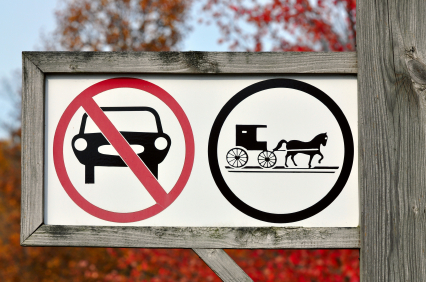 |
| Is this what people think of us? |
I say it's a perceived necessity because it's not exactly a real necessity in many cases. We've talked about the cost of owning a car, which we've established as being an enormous monthly and yearly expense. While the cost of housing in suburban areas may be lower, when you remove all (or even some) of the costs of car ownership, that can offset the sometimes-higher cost of urban life. Your transportation costs can drop considerably when your work, school, and necessities are accessible by public transit or on foot. Even if you choose to retain one car, you're still slashing that average yearly cost of car ownership by over half.
The reason I'm thinking about this is because I recently read The Summit Seeker, by ultramarathoner Vanessa Runs, which I highly recommend. Vanessa talks about her life as a modern nomad - after feeling stifled by her desk job for years, she took a leap of faith one day and changed her life completely. After quitting her job, Vanessa packed up and moved to San Diego from Canada with no job, no money, and no real plan other than to do the two things she loves most: write and run. Eventually Vanessa met her partner, Shacky, and the two of them got rid of most of their belongings, bought an RV, and now they travel around with their cat and dog, running in and volunteering at races, exploring trails, writing, and having fun.
 |
| Vanessa Runs during one of her adventures. |
I started thinking about Vanessa's current lifestyle and while, yes, she does own an RV and therefore drives a good bit, I wouldn't say that her lifestyle is at odds with my philosophy. For me, it's ultimately about simplification and a rejection of a pervasive system that aims keep us trapped in our cars, isolated from our neighbors, and in debt pretty much forever. Vanessa and Shacky do drive a vehicle, yes, but they've also managed to buck the status quo in their own way. They've eliminated a lot of bills that come with traditional home ownership and they make a living off of their passions. Their lifestyle is not extravagant, but they are very happy.
The point I'm making here is that contrary to what some may believe, I am not just anti-car or anti-driving. If that were the case, I'd have a serious conflict of interest going on when we rent a Timecar to go grocery shopping each week, or when we call an Uber to catch a ride to and from a friend's house who lives a little bit far away. You've got to do what you've got to do, and it's not always possible to adhere to a strict ideology, especially when that ideology relies heavily on excellent access to public transit and a safe, widespread system of sidewalks and bike lanes. Not all of us live in places that provide us with that ideal situation.
What we ultimately want to achieve with this blog is to prove that it's entirely possible to live without a car - or with less dependence on cars - in Oklahoma City, or places like it that aren't exactly equipped with all the alternative transportation bells and whistles. People have literally said to my face that you have to have a car to live here, but John and I are living proof that that's simply not true. However, rejecting the system and shedding your unnecessary encumbrances doesn't look the same for everyone, and I'm 100% okay with that. All I want is for people to really look at their lives and why they do the things that they do, and make the decisions for themselves, rather than just falling into what they've always seen being done. Your version could be ditching your car, dropping down to owning only one car, or it could be a little more out of left field: quitting your job, selling your house, and taking your RV right out of suburbia and into the great wide open. It's your life and your journey, and I want you to embrace it the best way you know how.
Make sure to catch our weekly segment on KOSU on Thursday mornings at 7:35am! Tune in at 91.7 FM or listen online at kosu.org. Follow us on Twitter at @CarlessInOKC for reminders to tune in. Make sure to tweet and tell us what you think!
Make sure to catch our weekly segment on KOSU on Thursday mornings at 7:35am! Tune in at 91.7 FM or listen online at kosu.org. Follow us on Twitter at @CarlessInOKC for reminders to tune in. Make sure to tweet and tell us what you think!

Great segment on bus perceptions today. Seems like the street car might not really improve public transportation much, what would you do with a 100 million dollars to improve transportation in OKC?
ReplyDelete